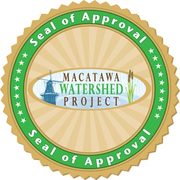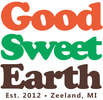Partnering with the Macatawa Watershed Project to protect our waters

Good Sweet Earth has been recognized by the Macatawa Watershed Project as a Watershed Partner for 2022, our fifth year earning this designation. To earn the Watershed Partner designation, West Michigan lawn care companies must meet several environmental criteria, which have been established by the Macatawa Area Coordinating Council to protect the Lake Macatawa watershed.
The Macatawa Watershed Project launched its Seal of Approval program in 2006. The program encourages local businesses and others in the watershed to use lawn care and landscaping best management practices to protect our environment.
The Macatawa Watershed is the land that drains to Lake Macatawa. The Macatawa Watershed has excess levels of phosphorus, a naturally occurring element present in fertilizer, which causes too many plants and algae to grow in the water. As these plants mature and die, they rob the water of oxygen, causing fish and plants to die which then adds more phosphorus to the water. The cycle continues and the water quality deteriorates.
The Macatawa Watershed Project is a program of the Macatawa Area Coordinating Council that has a goal to reduce the amount of phosphorus in Lake Macatawa by approximately 70%.
To be a Watershed Partner, a lawn care or landscaping company agrees to the following:
The Macatawa Watershed Project launched its Seal of Approval program in 2006. The program encourages local businesses and others in the watershed to use lawn care and landscaping best management practices to protect our environment.
The Macatawa Watershed is the land that drains to Lake Macatawa. The Macatawa Watershed has excess levels of phosphorus, a naturally occurring element present in fertilizer, which causes too many plants and algae to grow in the water. As these plants mature and die, they rob the water of oxygen, causing fish and plants to die which then adds more phosphorus to the water. The cycle continues and the water quality deteriorates.
The Macatawa Watershed Project is a program of the Macatawa Area Coordinating Council that has a goal to reduce the amount of phosphorus in Lake Macatawa by approximately 70%.
To be a Watershed Partner, a lawn care or landscaping company agrees to the following:
- The company observes the Michigan Fertilizer Act in regards to the use of fertilizers and best practices that must be used when applying fertilizers.
- Prior to applying fertilizer, the size of the lawn is measured to ensure the correct amount of fertilizer is applied.
- Grass is cut no shorter than three inches.
- All grass clippings and fertilizer are swept or blown off of impervious surfaces back into lawns to prevent runoff to storm drains. Every attempt is made to keep grass clippings from directly entering surface water bodies such as drains, streams and lakes.
- Mulching is preferred, but if grass clippings are taken off site, they are stored and composted properly in an area that is not susceptible to runoff.
- The company makes customers aware of best management practices for water quality (i.e. native plant use, waterfront landscaping).
- The company makes an effort to be aware of potential non-native invasive plant species, monitor for them and make clients aware when they are present on their property.
- In the case that the resident participates in the maintenance of their lawn, a schedule for watering and mowing is provided by the company.
- The company must maintain current certifications and/or licenses with the Michigan Department of Agriculture and Rural Development
